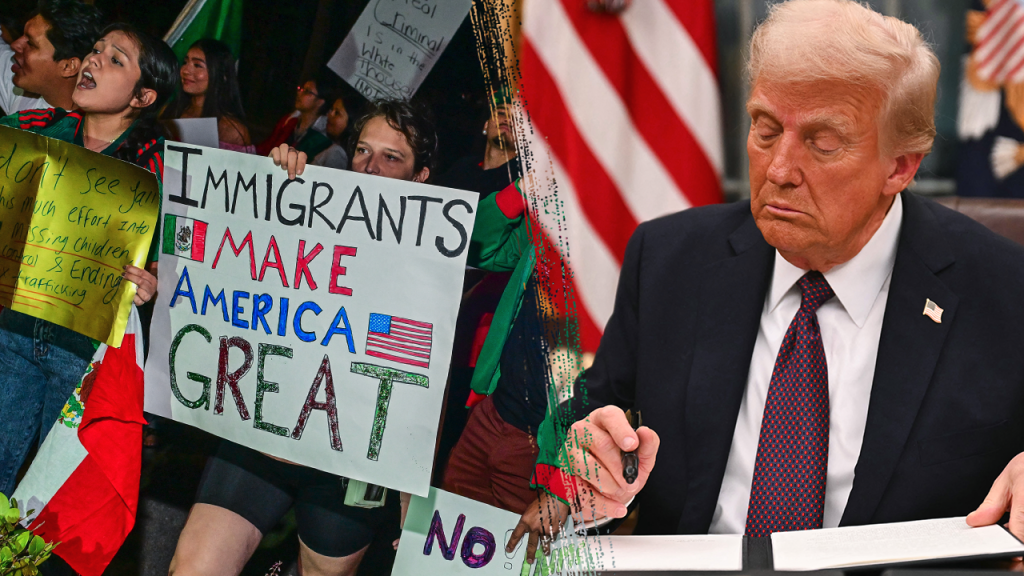In a significant ruling, the Supreme Court has lifted an injunction preventing the Trump administration from terminating the Temporary Protected Status (TPS) for approximately 300,000 Venezuelan migrants residing in the United States. This decision allows the administration to proceed with its hard-line immigration policies, which signify a shift away from protections established under previous administrations. Legal experts and advocates are closely monitoring the implications of this ruling, highlighting its potential repercussions on migrants’ lives and the contentious immigration debate in the United States.
| Article Subheadings |
|---|
| 1) Supreme Court’s Ruling Explained |
| 2) Implications for Venezuelan Migrants |
| 3) Legal Perspectives on the Decision |
| 4) Reaction from Advocacy Groups |
| 5) The Broader Immigration Debate |
Supreme Court’s Ruling Explained
On Monday, the Supreme Court made a pivotal ruling by lifting an injunction that had blocked President Donald Trump’s administration from terminating the protected legal status of Venezuelan migrants. The TPS program was established to protect individuals from countries affected by natural disasters or armed conflict. The decision came after U.S. Solicitor General John Sauer argued that a lower court had overstepped its bounds by stopping the administration from enforcing its policy. This ruling underscores the Court’s support for the current administration’s immigration strategy, aligning with its broader trend of permitting state-led enforcement measures. It signals a more stringent approach to immigration that could reshape the landscape for countless migrants in the U.S.
Implications for Venezuelan Migrants
This ruling has immediate implications for around 300,000 Venezuelan migrants who have been living in the United States under TPS. Before this ruling, many were shielded from deportation due to the precarious situation in Venezuela, where economic collapse and political turmoil have created dire living conditions. With the lifting of the injunction, these migrants may soon face the risk of deportation to a country grappling with widespread violence and instability. This situation is particularly alarming for families who have built their lives in the U.S. and now face uncertainty about their futures.
Legal Perspectives on the Decision
From a legal standpoint, the Supreme Court’s decision raises questions about the judicial balance of power concerning immigration. Legal analysts suggest that the ruling amplifies the executive branch’s authority in immigration matters, possibly setting a precedent for how legal protections for migrants are handled in the future. Critics argue that the decision undermines the judiciary’s role as a check on executive power, particularly in areas that significantly affect human rights. Additionally, the ruling may inspire other states with similarly stringent immigration policies to push for more aggressive enforcement mechanisms, thereby altering the status quo.
Reaction from Advocacy Groups
In the wake of the Supreme Court’s ruling, various advocacy groups expressed their outrage, emphasizing the human toll that such decisions impose on vulnerable communities. Organizations focused on immigrant rights have decried the potential for mass deportations, highlighting the risks faced by returning individuals to Venezuela, particularly those with no familial ties left. Activists assert that the decision is not just a legal matter, but a moral one, painting a bleak picture for the affected families. Many advocacy groups are rallying support to challenge this ruling in various ways, including lobbying for legislative protections and increased awareness of the plight faced by these migrants.
The Broader Immigration Debate
This ruling is part of a larger immigration debate that has been ongoing in the United States, centered on how best to manage the influx of migrants and the legal status afforded to them. As the country grapples with shifting demographics and economic pressures, tensions surrounding immigration policies have intensified. The Supreme Court’s decision could reignite discussions among legislators about comprehensive immigration reform, which has been stalled for years. Advocates for reform argue that a more humane approach is necessary, one that addresses the root causes of migration, rather than merely focusing on enforcement. This development may influence political dynamics in Congress, particularly as lawmakers face pressure from constituents concerned about the treatment of immigrants.
| No. | Key Points |
|---|---|
| 1 | The Supreme Court lifted an injunction blocking the termination of TPS for Venezuelan migrants. |
| 2 | The decision affects approximately 300,000 Venezuelans in the U.S., making them vulnerable to deportation. |
| 3 | Legal experts believe the ruling sets a precedent for increased executive power in immigration matters. |
| 4 | Advocacy groups are mobilizing in response, highlighting the impending humanitarian crisis. |
| 5 | The ruling could intensify discussions on immigration reform among lawmakers. |
Summary
The Supreme Court’s decision to lift the injunction against the termination of Temporary Protected Status for Venezuelan migrants marks a critical moment in the ongoing debate over immigration policy in the United States. As the administration prepares to implement these changes, the potential repercussions—especially concerning the lives of affected migrants—may fuel further advocacy efforts and activism. This ruling not only highlights the tension between legal authority and human rights, but it also serves as a reminder of the complexities of immigration in contemporary America.
Frequently Asked Questions
Question: What is Temporary Protected Status (TPS)?
Temporary Protected Status (TPS) is a humanitarian program that provides temporary refuge to individuals from countries experiencing temporary crises, such as war or natural disasters, allowing them to remain and work legally in the United States.
Question: How does this ruling impact Venezuelan migrants specifically?
The ruling threatens to deport Venezuelan migrants who have been protected under TPS, forcing them to return to a country facing extreme political and economic instability.
Question: What are the potential implications of this ruling for future immigration policy?
This ruling may encourage more aggressive immigration enforcement policies, diminish the role of the courts in checking executive power, and potentially reshape discussions on comprehensive immigration reform.


